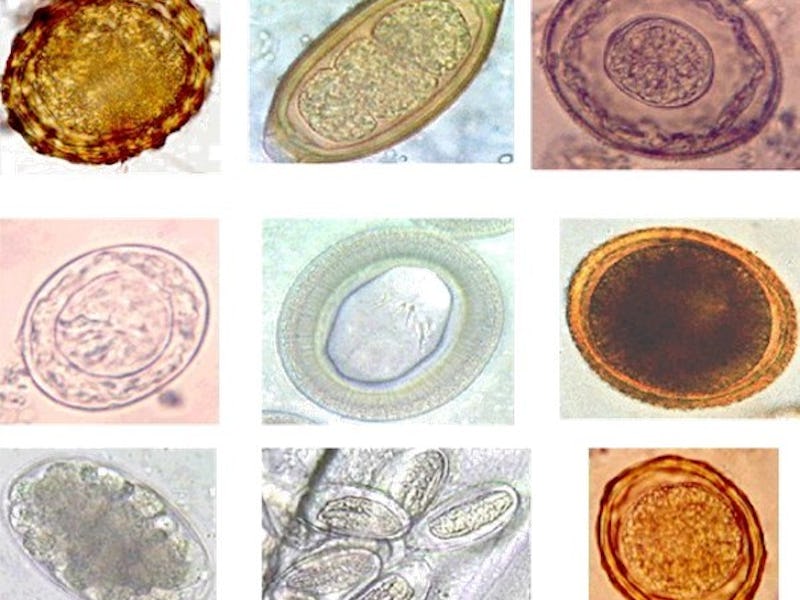Women Infected With Giant Roundworms Have a Greater Chance of Becoming Pregnant
A new investigation reveals certain kinds of soil-transmitted helminths can enhance fertility.

There can’t be any pretense that anyone would want parasitic worms wiggling about in their intestines. Even soil-transmitted helminths — intestinal worms that are contracted in a cringe-inducing spiral of ingesting dirt or vegetables with traces of human feces that contain the eggs of helminths — that have the possibility of helping to create something very lovely. But if you’re a sexually active lady and do have a certain kind of parasitic worm, you can count on one thing: you have a greater chance of getting preggers.
New research recently published in Science reveals that a certain species of helminth has been found to increase the reproductive rate of women infected with the parasite. An analysis of nine years of longitudinal data found that an infection of roundworm — Ascaris Lumbricoides — is associated with earlier first births and shortened interbirth intervals. The women in the study with this particular parasitic worm were found to conceive two more children on average than the women who were not infected.
Some of these . . .
Could help get one of these.
Not that this is exactly thrilling news to the Bolivian women who have been found to be infected with giant roundworms.
“Most people do not know they are infected,” said study co-author Aaron Blackwell to Inverse. “When they sometimes find out, for example by passing a worm in their stool, they are just as grossed-out as any American would be.”
Previous studies have shown that parasites can influence their host’s sexual behavior, offspring size, conception rates, and incubation periods. The researchers behind this most recent study believe that this type of roundworm may increase the fertility of its host because pregnancy is both affected by and alters immunity. When a parasite like this alters the immune system, it’s easier to become pregnant.
“When we looked at the data, what surprised us most was the size of the effect — we hadn’t predicted we’d see such a large or robust change in fertility,” says Blackwell. “That’s why we tried very hard to eliminate other possible explanations for the association, before accepting that it really was an effect due to the helminth infection.”
The inspiration for the study came from curious coincidence. Blackwell and his team began studying the Tsimane people of Bolivia — indigenous forager-horticulturalists — in 2002, with the goal of studying aging and disease. At this time, a wife of one of the co-authors traveled with him to the field and decided to start trying to conceive.
“She became pregnant very quickly and somewhat offhandedly wondered if getting infected with helminths might have helped her,” says Blackwell. “We knew that helminths had effects on the immune system, and that these were similar to some of the changes in immunity that happen during pregnancy. So it seemed possible.”
The Tsimane live in the lowlands of Bolivia.
However, while giant roundworm infection has a high correlation with increased fertility, the study also found that different species of helminth had contrasting effects. Specifically, infection with hookworm was found to be associated with delayed first pregnancy and extended interbirth intervals. While 70 percent of the Tsimane population is infected with helminths, only 15 to 20 percent can be credited to roundworms. Approximately 56 percent of the population is infected with hookworm; the women within this group are predicted to have three fewer children than uninfected women.
It’s hard to see helminths as a force of good — heavy infections can lead to terrible things like blood and protein loss, abdominal pain, and physical and cognitive growth retardation. While giant roundworms can lead to increased fertility, the parasitic worm can also cause intestinal blockage and stunt the growth of children.
But, with the intervention of science, some positivity can come from parasitic worms. The authors of this recent study say that — after much, much more work is done — using worms as a fertility treatment could be an “intriguing possibility.” Previously, because parasitic helminths can alter and suppress immune responses, they have been found to have a positive effect on inflammatory bowl conditions, asthma, and Crohn’s disease. Treatment of Crohn’s with a particular intestinal helminth — Trichuris suis — has been found to be a “safe and effective” treatment in the short-term.
The next step for the giant roundworms here is to verify their effect with a controlled experimental trial, in order to better identify the immunological parameters involved.
“Whilst I wouldn’t want to suggest that women try and become infected with roundworms as a way of increasing their fertility,” said co-author Allan Pacey to the BBC, “further studies of the immunology of women who do have the parasite could ultimately lead to new and novel fertility enhancing drugs.”